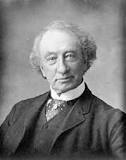“The evil that men do lives after them; The good is oft interred with their bones.” – William Shakespeare, “Julius Caesar”
Sir John Alexander Macdonald, Canada’s first and six-times-elected prime minister, was born on either January 10 or 11, 1815. On the 206th anniversary of the event, it would be worthwhile for Canadians to learn more about him and review his eventful life.
Dare we consider celebrating him?
Today, Macdonald seems best known for his part in the operation of Indian residential schools and his government’s imposition of the racist Chinese head tax. But these stories alone only partly accord Macdonald his proper place in history. There was more, much more.
Indian residential schools were in operation long before Macdonald began his life in politics. They began in New France (1534-1763). The Mohawk Institute in Ontario opened for indigenous boarding students in 1831. The schools became government policy only after 1883, and remained so until 1996 under many successive governments and prime ministers.
The schools have left marks we will be talking about – and regretting – for many years to come. But they were not Macdonald’s invention. Indeed, it was only in 1920, long after Macdonald’s death, that an Indian Act amendment made attendance at Indian residential or Indian day schools compulsory for First Nations children.
After construction of Canada’s trans-continental railroad was completed, Macdonald was persuaded by others that something needed to be done to curb Chinese immigration to Canada. The discriminatory head tax imposed by his government was increased substantially by subsequent governments. Ultimately, in 1923, the Liberal government of William Lyon Mackenzie King banned Chinese immigration – with a few exceptions – altogether. The ban kept Chinese people out of Canada until it was finally removed in 1947. Macdonald started it; others made it much worse, and far more racist.
Yet Macdonald is one of few leaders who is condemned so bitterly by today’s reconstructors of Canadian history.
No doubt there were other shortcomings in Macdonald’s leadership, as there have been with every leader this country has ever had. With each of these stories there were sub-plots, the history of which has been all but forgotten. And certainly the historical context has been ignored.
The very thought of commemorating Macdonald’s life is abhorrent to some people. But should it be?
Macdonald was a candidate in 20 elections in three Canadian provinces, including Manitoba. He lost only one. In 1843, he began his long political career by running for the position of alderman in Kingston, Ontario. Before Confederation in 1867, he ran seven times in constituencies in the Province of Canada and held leadership positions, including Joint Premier. After Confederation, he ran in 12 federal constituencies, losing only once. As prime minister, he presided over six majority governments. He served the people for 48 of his 76 years.
Who elected Macdonald all those times? The people did.
Why celebrate Macdonald? On his passing in 1891, Liberal leader and later Prime Minister Sir Wilfrid Laurier said: “… the place of Sir John A. Macdonald in this country was so large and so absorbing that it is almost impossible to conceive that the politics of this country, the fate of this country, will continue without him.”
Why did Laurier – Macdonald’s political opponent – eulogize Macdonald so magnanimously?
Was it because Macdonald was a leading “father of Confederation”?
Was it because Macdonald united Canada by ensuring the construction of a trans-continental railroad (despite the scandal associated with it)?
Was it because of Macdonald’s efforts to prevent American annexation of Canadian lands?
Was it for Macdonald’s tariff protection measures (part of his “National Policy” that lasted more than seventy years) which grew the Canadian economy?
Was it because Macdonald’s (and Liberal Prime Minister Alexander Mackenzie’s) government ensured indigenous Canadians were vaccinated against smallpox, saving thousands of lives?
Was it because Macdonald commissioned the Royal Northwest Mounted Police to protect indigenous people from American guns and whiskey, to prevent possible United States military incursion, and to pave the way for the peaceful settlement of the west?
Louis Riel is known by many as the father of Manitoba. Each year, in February, Manitobans pay respect to Riel’s part in the development of our country. The stormy relationship that existed between Riel and Macdonald 151 years ago nonetheless culminated in the creation of our province through the Manitoba Act passed by Macdonald’s parliament in 1870.
Similarly, even though the personal relationship between Macdonald and Clear Grit Party leader George Brown was far from friendly, they put personal feelings aside, worked with other leaders, and built a country.
A dedicated conservative, Macdonald put politics aside and worked constructively and pragmatically with friend and political foe alike.
The country founded and built by Macdonald and his contemporaries is today one of the finest countries in the world in which to live, work, raise families and find happiness. The country has grown, prospered, suffered pandemics and depression, engaged in war, enjoyed peace and become a leading nation on the world stage.
Sir Wilfrid Laurier questioned whether Canada could endure without Macdonald’s leadership, but it has, and it will. The foundations laid by Macdonald and his colleagues ensure that our nation will endure for a very long time. That is something to be celebrated, not regretted and condemned.
Perhaps it is not unreasonable to hope that January 10/11 can be days when we can reflect, with broader minds, not only on their misdeeds, but also on the achievements and contributions of pioneer leaders like Sir John Alexander Macdonald.
Reprinted from The Brandon Sun.
James C. McCrae, Brandon resident and former attorney general of Manitoba.



